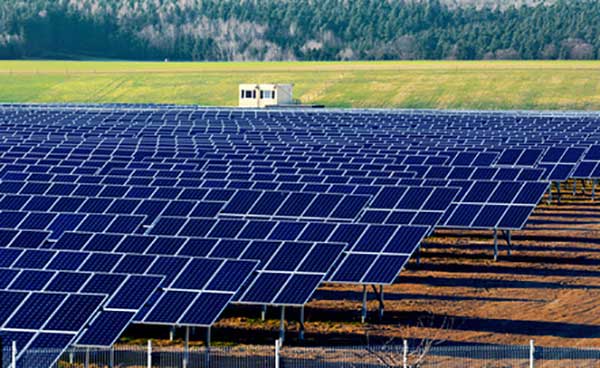Every now and then we like to take a look at what’s happening in solar energy research, weigh the pros and cons and see how it will play out in our wide, brown land. This week we’ve got a beauty. We’ll look at a novel way to combine (the word is co-locate) two forms of clean energy: photovoltaics and biofuel crops.
Earlier this year researchers at Stanford University announced that by co-locating solar panels and carefully chosen plants suited to the location, two forms of renewable energy may be cultivated from marginal lands. Solar and biofuel. The study recommends that the crops be planted between rows of photovoltaic panels on solar farms and would therefore benefit from water runoff used to clean the panels.
“Co-located solar-biofuel systems could be a novel strategy for generating two forms of energy from uncultivable lands: electricity from solar infrastructure and easily transportable liquid fuel from biofuel cultivation,” said Suhjith Ravi who, along with David Lobell and Chris Field is conducting research into the co-location strategy at the Stanford Woods Institute for the Environment.
The key is the recycling of the water used to clean the solar panels to feed the plants. The panels need to be constantly washed to ensure they operate at maximum efficiency and the ground watered to prevent dust buildup.
The research appears to be no more than applied good old-fashioned common sense. However it appears to have a great deal of potential. This technique will help increase the yield of energy from land where normal crops are not suited. Not only this but the roots of desert crops planted in the rows will help to “anchor” the soil and help prevent dust.
Clever thinking indeed but can this be applied in Australia?
This way of producing two forms of renewable energy in the one location was developed at Stanford for arid areas in the United States where water is at a premium. Sounds familiar? As the driest continent on the Earth, the method is well suited to our country. Many of our solar farms are situated in areas where sunlight is plentiful, though may not be so endowed with water. As such, any water used to keep the panels clean should be recycled as many times as possible. What better way than to water plants that thrive in the harsh environment and can be converted easily to biofuels?
The Stanford researchers suggest the agave plant as being ideal for the job though a variety of plants may be suitable for Australian conditions.
Studies have been conducted on both sides of the renewable energy debate to back up claims of renewables such as solar energy vs the production of biofuels. The debate rages as to which is more efficient in the light of the dwindling availability of research and development funds. For a detailed analysis of the debate, see this September 2012 article from The Conversation.
Rather than considering biofuels and PV as competing for the limited research budget, why not think of them as two sides of the same renewable energy coin? Photovoltaics and biofuel crops combined (or more accurately co-located) may increase the amount of energy produced and save on water used. Another nail in the coffin for fossil fuels? Please have your say.


 RSS - Posts
RSS - Posts



Hmmm, commercial plant crops need a lot more water than the washings off a shiny surface. The Spanish found that plants thrived in what was desert, under the shelter of their huge tents which were part of their “Solar updraft towers” https://en.wikipedia.org/wiki/Solar_updraft_tower . maybe the shade of the solar panels is important for productive plant growth, but without a good supply of water, plant economics dictate low productivity.
Thanks Ray. Obviously the plants required would need to be hardy and able to be turned into biofuel efficiently. The Stanford researchers suggest agave?